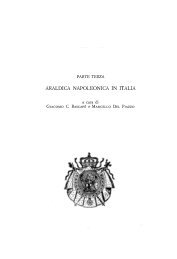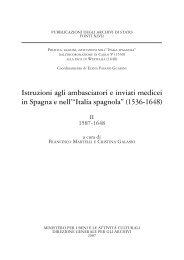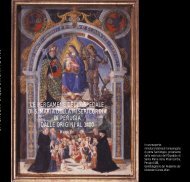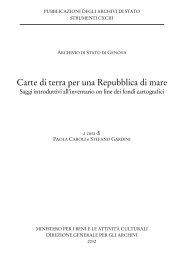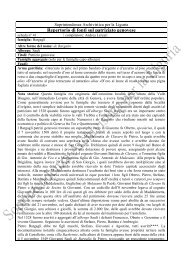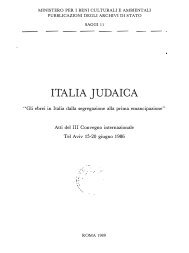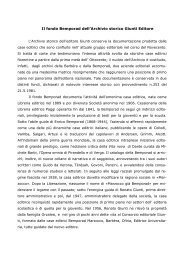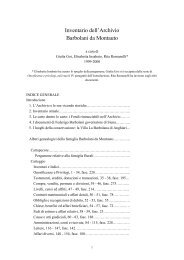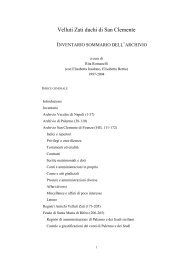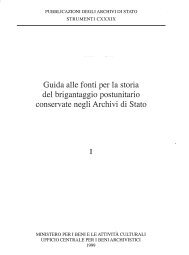- Page 1 and 2:
DEPUTAZIONE DI STORIA PATRIA PER L'
- Page 3 and 4:
II SOMMARIO P ADLO LANGELLA, Cultur
- Page 5 and 6:
Non è certo senza motivo e signifi
- Page 7 and 8:
x PRESENTAZIONE a cinque temi princ
- Page 9 and 10:
XIV CRONACA zio ne, che sono preval
- Page 11 and 12:
XVIII CRONACA anche attraverso la v
- Page 13 and 14:
XXII CRONACA poi espresso la profon
- Page 15 and 16:
XXVI PROGRAMMA Toscana nel secondo
- Page 17 and 18:
xxx INTERVENUTI John Anthony Davis,
- Page 19 and 20:
XXXIV INTERVENUTI Nazareno Romani,
- Page 21 and 22:
PIERLUIGL BERTINARIA LO STANZIAMENT
- Page 23 and 24:
8 PIERLUIGI BERTINARIA vava di stan
- Page 25 and 26:
12 PIERLUIGI BERTINARIA zione fu ef
- Page 27 and 28:
16 PIERLUIGI BERTINARIA do l'Eserci
- Page 32 and 33:
GIORGIO ROCHAT - STRUTTURE DELL'ESE
- Page 34 and 35:
24 GIORGIO ROCHAT nel decennio) un
- Page 36 and 37:
28 GIORGIO ROCHAT me cambiò tutti
- Page 38 and 39:
32 GIORGIO ROCHAT STRUTTURE DELL'ES
- Page 40 and 41:
36 GIORGIO ROCHAT paralleli (per es
- Page 42 and 43:
40 GIORGIO ROCHAT gionale sembra se
- Page 44 and 45:
44 GIORGIO ROCHAT TABELLA VIII. For
- Page 46 and 47:
48 GIORGIO ROCHAT nel 1882, che acc
- Page 48 and 49:
1875-1884 STRUTTURE DELL'ESERCITO D
- Page 50 and 51:
56 GIORGIO ROCHAT 1899-1908 1875-18
- Page 52 and 53:
60 Sicilia Catania Girgenti Messina
- Page 54 and 55:
64 PATRIZIA FERRARA cospicua, da ri
- Page 56 and 57:
68 PATRIZIA FERRARA porto tra eserc
- Page 58 and 59:
72 PATRIZIA FERRARA nati tra il l88
- Page 60 and 61:
INDICE DEI FON DI ARCHIVISTICI Legg
- Page 62 and 63:
80 PATRIZIA FERRARA « Guerra 1915-
- Page 64 and 65:
84 PATRIZIA FERRARA Argomenti per l
- Page 66 and 67:
88 PATRIZIA FERRARA La categoria n.
- Page 68 and 69:
92 PATRIZIA FERRARA l'interno dei c
- Page 70 and 71:
96 PATRIZIA FERRARA « Irregolarit
- Page 72 and 73:
100 PATRIZIA FERRARA La documentazi
- Page 74 and 75:
104 PATRIZIA FERRARA Direzione Gene
- Page 76 and 77:
108 PATRIZIA FERRARA Direzione Gene
- Page 78 and 79:
112 PATRIZIA FERRARA TRIBUNALI MILI
- Page 80 and 81:
116 PATRIZIA FERRARA - Badoglio Pie
- Page 82 and 83:
120 PATRIZIA FERRARA - Pelloux Luig
- Page 84 and 85:
RENATO GRISPO: Prima di dare inizio
- Page 86 and 87:
MARIO ISNENGHI CULTURA E RUOLO SOCI
- Page 88 and 89:
132 MARIO ISNENGHI analitico di cui
- Page 90 and 91:
136 MARIO ISNENGHI storica, le sign
- Page 92 and 93:
140 MARIO ISNENGHI trarre diverse n
- Page 94 and 95:
144 MARIO ISNENGHI sia storicamente
- Page 96 and 97:
PIERO DEL NEGRO CASERMA E CITTÀ NE
- Page 98 and 99:
152 PIERO DEL NEGRO dell'esercito d
- Page 100 and 101:
156 PIERO DEL NEGRO di esistenze, n
- Page 102 and 103:
160 PIERO DEL NEGRO tanto calunniat
- Page 104 and 105:
164 PIERO DEL NEGRO Anche se non fo
- Page 106 and 107:
168 PIERO DEL NEGRO Sia pure a cert
- Page 108 and 109:
172 VINCENZO CACIULLI il modello di
- Page 110 and 111:
176 VINCENZO CACIULLI La piccola in
- Page 112 and 113:
180 VINCENZO CACIULLI Nelle due ser
- Page 114 and 115:
ANTHONY L. CARDOZA AN OFFICER AND A
- Page 116 and 117:
188 ANTHONY L. CARDOZA nant presenc
- Page 118 and 119:
192 ANTHONY L. CARDOZA eventually e
- Page 120 and 121:
196 ANTHONY L. CARDOZA abiding comm
- Page 122 and 123:
PAOLO LANGELLA · CULTURA E VITA DE
- Page 124 and 125:
204 PAOLO LANGELLA però ben diffic
- Page 126 and 127:
208 PAOLO LANGELLA to " 11. Quest'u
- Page 128 and 129:
212 PAOLO LANGELLA guerra, una vera
- Page 130 and 131:
216 PAOLO LANGELLA toilettes né po
- Page 132 and 133:
220 DANIELA MALDINI CHIARITO Per ri
- Page 134 and 135:
224 DANIELA MALDINI CHIARITO mente
- Page 136 and 137:
FILIPPO MAZZONIS · USI DELLA BUONA
- Page 138 and 139:
232 FILIPPO MAZZONIS Semplificando
- Page 140 and 141:
236 FILIPPO MAZZONIS rapporto reale
- Page 142 and 143:
240 FILIPPO MAZZONIS consumarle), e
- Page 144 and 145:
244 FILIPPO MAZZONIS Adua al '98, d
- Page 146 and 147:
248 FILIPPO MAZZONIS gativo delle n
- Page 148 and 149:
252 FILIPPO MAZZONIS un argine al f
- Page 150 and 151:
256 JANINE MENET - GENTY Gli autori
- Page 152 and 153:
260 JANINE MENET - GENTY dicono ora
- Page 154 and 155:
264 JANINE MENET - GENTY to un esit
- Page 156 and 157:
268 JANINE MENET - GENTY mo nobile.
- Page 158 and 159:
272 ]ANINE MENET - GENTY Però l'al
- Page 160 and 161:
276 MARCO MERIGGI niera, il più co
- Page 162 and 163:
280 MARCO MERIGGI Esiste un terreno
- Page 164 and 165:
284 MARCO MERIGGI mente domiciliate
- Page 166 and 167:
288 MARCO MERIGGI commentava a ques
- Page 168 and 169:
292 MARCO MERIGGI aree rurali che i
- Page 170 and 171:
296 MARCO MERIGGI entità che carat
- Page 172 and 173:
300 FORTUNATO MINNITI nosciuta, con
- Page 174 and 175:
304 FORTUNATO MINNITI computo le ri
- Page 176 and 177:
308 FORTUNATO MINNITI o E-< o 0:::
- Page 178 and 179:
312 FORTUNATO MINNITI 4. La maggior
- Page 180 and 181:
316 FORTUNATO MINNITI trimoni tra n
- Page 182 and 183:
PAOLA NAVA UFFICIALE E GENTILUOMO.
- Page 184 and 185:
324 PAOLA NAVA po avere espresso la
- Page 186 and 187:
328 PAOLA NAVA " L'ufficiale in que
- Page 188 and 189:
332 PAOLA NAVA spandere, perché no
- Page 190 and 191:
336 PAOLA NAVA donna romantica. Cer
- Page 192 and 193:
340 LA DISCUSSIONE que tenuto prese
- Page 194 and 195:
344 LA DISCUSSIONE della Marina ita
- Page 196 and 197:
EMILIO FRANZINA CASERMA, SOLDATI E
- Page 198 and 199:
352 EMILIO FRANZINA terno urbano vi
- Page 200 and 201:
356 EMILIO FRANZINA (e cioè, il pi
- Page 202 and 203:
360 EMILIO FRANZINA stesse allora v
- Page 204 and 205:
364 EMILIO FRANZINA dalla presenza
- Page 206 and 207:
368 EMILIO FRANZINA presenza di " d
- Page 208 and 209:
372 EMILIO FRANZINA il filo di altr
- Page 210 and 211:
376 EMILIO FRANZINA l che il " quar
- Page 212 and 213:
380 EMILIO FRANZINA bi avversari de
- Page 214 and 215:
384 EMILIO FRANZINA to il profilo g
- Page 216 and 217:
388 EMILIO FRANZINA complementare d
- Page 218 and 219:
392 DARIO BlOCCA Nel l900 Matilde S
- Page 220 and 221: 396 DARIO BlOCCA L'indice della mor
- Page 222 and 223: 400 DARIO BlOCCA cittadini vivevano
- Page 224 and 225: 404 DARIO BlOCCA Secondo alcuni stu
- Page 226 and 227: 408 DARIO BlOCCA zione fluviali e f
- Page 228 and 229: 412 DARIO BlOCCA iscritte alla Capi
- Page 230 and 231: 416 FERRUCCIO BOTTI non è tipica s
- Page 232 and 233: 420 FERRUCCIO BOTTI Un altro fattor
- Page 234 and 235: 424 FERRUCCIO BOTTI te, la guerra d
- Page 236 and 237: 428 FERRUCCIO BOTTI dente dal conte
- Page 238 and 239: 432 FERRUCCIO BOTTI Le illuminanti
- Page 240 and 241: 436 GIUSEPPE CAFORIO che va all Uni
- Page 242 and 243: 440 GIUSEPPE CAFORIO tra comandi mi
- Page 244 and 245: 444 GIUSEPPE CAFORIO a lire 8.524.3
- Page 246 and 247: 448 GIUSEPPE CAFORIO Nella loro att
- Page 248 and 249: 452 GIUSEPPE CAFORIO CONSIDERAZIONI
- Page 250 and 251: j l 2 3 j 6 1 l 1 l t' Il 12 -f} ,
- Page 252 and 253: 460 BRUNELLA DALLA CASA - FIORENZA
- Page 254 and 255: 464 BRUNELLA DALLA CASA - FIORENZA
- Page 256 and 257: 468 BRUNELLA DALLA CASA - FIORENZA
- Page 258 and 259: 472 BRUNELLA DALLA CASA - FIORENZA
- Page 260 and 261: 476 BRUNELLA DALLA CASA - FIORENZA
- Page 262 and 263: 480 BRUNELLA DALLA CASA - FIORENZA
- Page 264 and 265: 484 JOHN A. DA VIS sions of protest
- Page 266 and 267: 488 JOHN A. DA VIS and more specifi
- Page 268 and 269: 492 JOHN A. DAVIS while the Procura
- Page 272 and 273: 500 GIANNI ISOLA patriottiche. Tipi
- Page 274 and 275: 504 GIANNI ISOLA - dopo il diluvio
- Page 276 and 277: 508 GIANNI ISOLA 1876 Torino era co
- Page 278 and 279: 512 GIANNI ISOLA Ma dovevano passar
- Page 280 and 281: 516 GIANNI ISOLA UN LUOGO D'INCONTR
- Page 282 and 283: NICOLA lABANCA I PROGRAMMI DELL'EDU
- Page 284 and 285: 524 NICOLA LABANCA espliciti di 'na
- Page 286 and 287: 528 NICOLA LABANCA pubblicato in pi
- Page 288 and 289: 532 NICOLA LABANCA vette infatti un
- Page 290 and 291: 536 NICOLA LABANCA Le riviste tecni
- Page 292 and 293: 540 ERIC LABAYLE entière » est pr
- Page 294 and 295: 544 ERIC LABAYLE x Engagés volonta
- Page 296 and 297: 548 ERIC LABA YLE vie locale avait
- Page 298 and 299: 552 ERIC LABA YLE Les décès et l
- Page 300 and 301: 556 ERIC LABAYLE nouveau changement
- Page 302 and 303: BARBARA MAFFIODO - PAOLA NICOLA PRO
- Page 304 and 305: 564 BARBARA MAFFIODO - PAOLA NICOLA
- Page 306 and 307: 568 BARBARA MAFFIODO - PAOLA NICOLA
- Page 308 and 309: 572 BARBARA MAFFIODO - PAOLA NICOLA
- Page 310 and 311: 576 BARBARA MAFFIODO - PAOLA NICOLA
- Page 312 and 313: 580 BARBARA MAFFIODO - PAOLA NICOLA
- Page 314 and 315: 584 ROBERTO MOROZZO DELLA ROCCA van
- Page 316 and 317: 588 ROBERTO MOROZZO DELLA ROCCA te
- Page 318 and 319: 592 ROBERTO MOROZZO DELLA ROCCA sci
- Page 320 and 321:
596 ROBERTO MOROZZO DELLA ROCCA der
- Page 322 and 323:
600 ANTONIO SEMA 3) l maschi in div
- Page 324 and 325:
604 ANTONIO SEMA " disgustoso »: d
- Page 326 and 327:
608 ANTONIO SEMA potenziale: una fo
- Page 328 and 329:
612 ANTONIO SEMA tazione del ,, con
- Page 330 and 331:
l) Il caso di Genova GIOVANNI BATTI
- Page 332 and 333:
620 GIOVANNI BATTISTA VARNIER deva
- Page 334 and 335:
624 GIOVANNI BATTISTA VARNIER di ri
- Page 336 and 337:
628 GIOVANNI BATTISTA VARNIER immob
- Page 338 and 339:
632 GIOVANNI BATTISTA VARNIER tario
- Page 340 and 341:
636 GIOVANNI BATTISTA VARNIER sua d
- Page 342 and 343:
640 GIOVANNI BATTISTA VARNIER serci
- Page 344 and 345:
DISCUSSIONE
- Page 346 and 347:
648 LA DISCUSSIONE ta un proemio de
- Page 348 and 349:
652 LA DISCUSSIONE engagement natio
- Page 350 and 351:
656 LA DISCUSSIONE Incomincerei pro



